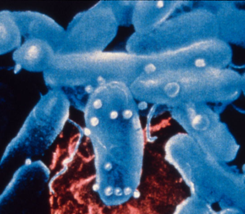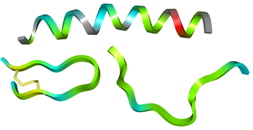Infectious diseases are responsible for a third of all deaths on the planet, and current therapeutifc approaches are under severe threat due to antibiotic resistance. The laboratory of CBR member Bob Hancock is engaged in research to address this growing problem. By using systems biology approaches to understand the mechanisms of action of antimicrobial petides and their role as modulators of innate immunity, they are developing novel treatment approaches based on the immunomodulatory and antibiotic activities of host defense peptides.
Innate immunity exists in all complex species of life, including man, as part of the first line of defence against infections. It is a highly effective, evolved and complex general defence system that features broad specificity against infectious agents and rapid response to infection within minutes to hours. Many of the key cells of innate immunity in man and animals reside in the blood. As a strategy to treat infections, the group of CBR member Bob Hancock, Director of the Centre for Microbial Diseases and Immunity Research, is attempting to modulate innate immunity. This is no easy task, since activation of the innate immune system can stimulate both a protective immune response and a potentially harmful inflammatory cascade. Another complication is the sheer complexity of this process with the involvement of 1500 to 5000 gene products, small RNA species etc.

To understand the complexity of host immune responses to pathogens, the Hancock group has developed new bioinformatic tools for studying the systems biology of innate immunity including a database of innate immunity proteins and their interactions (InnateDB), a sophisticated Meta-analysis tool (MetaGEX) and new network visualization strategies (Cerebral). Understanding host responses is enabled through tools that analyze complex gene expression sets for overrepresented pathways, functional categories (gene ontology), transcription factor influences, and interacting partners, employing sophisticated clustering algorithms. This has enabled systems level investigations enabling more in depth hypothesis building and understanding of the immediate host responses to pathogenic challenge, and the mechanisms employed in our new therapeutic strategies.

Cationic host defence (antimicrobial) peptides are produced by virtually all organisms, ranging from plants and insects to humans, as a major part of their immediate, relatively non-specific (innate) immune defences against infection. Although originally noted for their modest direct antimicrobial activity, it is now well established that host defence peptides profoundly modulate innate immunity. Microarrays, sophisticated bioinformatics, and pathway and transcription factor studies have demonstrated that these peptides stimulate innate immunity in peripheral blood mononuclear (white blood) cells in a unique fashion, boosting protective immunity while suppressing potentially harmful inflammation/sepsis. Using the principle of selective boosting of innate immunity, the Hancock laboratory has developed novel small innate defence regulator (IDR) peptides with no direct antibacterial activity, that are nevertheless able to protect in animal models against many different microbial infections and inflammatory disease, including antibiotic resistant infections and malaria, providing a new concept in anti-infective therapy.
A search on PubMed for RE Hancock will provide lots more information, examples of which can be found here: BMC Systems Biology 2010:4:117, The Journal of Immunology and Molecular BioSystems.


